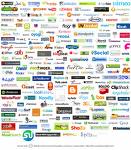Many banks are making the leap into a new era being called: “online banking 2.0”. Apparently, consumers used to be easily converted to banking online whereas now the conversion process is slowing down a bit. So banks think their next move should involve beefing up services offered to attract new customers who otherwise might not be interested in online banking.
What can we expect from banks in the near future? Same day bill pay, account aggregation (viewing all your accounts, even those from different institutions, under one login screen), prediction of future account balances, and specific tracking of spending habits.
It seems kind of screwy, if you ask me. That is, the idea that unwilling adopters must be waiting for new services before willing even to check their account balance online. If anything, these new services might make the conversion process all the more intimidating. Perhaps the banks are overlooking other reasons for a decline in the online banking growth rate…
I, for one, have handled most of my banking needs online for a few years now and am interested to test drive some of these new services. Same day bill pay being a prime example. I’ve always been disappointed that, in this day and age, banks still need 3-7 days to get my money somewhere else. But that’s likely to change within the next year, all in the name of attracting new customers. Whatever the reasoning, I’m ready even if not a new customer.
Now, about account aggregation: The idea is that you would give your primary financial institution logins and passwords to other accounts you may have (such as retirement accounts, investment accounts, credit card accounts, even frequent flier miles, etc.) so that your main screen, after logging in, is a compilation of all your financial accounts. The skeptics claim that this type of integration is not secure while banks counter with talk of the need to register your computer to increase security (meaning, though this is all done online, it’s only accessible from the one computer you preregister with your bank).
